What can you do?
The new Copyright Act
With the forthcoming changes to Myanmar’s copyright law, it’s important to raise awareness of what the new Act entails at your university and college. This is particularly important because once the two-year transition period ends, penalties will apply for copyright infringement. You could:
- host an event or invite a speaker to your university or college to explain what the new Act means for you
- make copies of the new Act available to educators and students
- summarise the key points from the Act and what it means for your university students and educators
- create resources to remind colleagues why and how they should reference the materials that they use
- offer to review materials to check referencing
- keep up-to-date with developments via national organisations such as MIPRA and get involved with some of the initiatives discussed in this course.
The benefits of OER
You might also want to raise awareness of the existence of OER and openly licensed resources and the benefits for your students and colleagues. You could:
- host an annual ‘open education’ day at your university or college
- showcase and curate open resources that students and teachers might want to use, or OER that your students and educators have created
- hold events to teach students and colleagues about Creative Commons and open education
- You can reuse existing OER (such as this course!) and other OER to help you.
- If a licence permits, you may also be able to remix the material to better suit your university – just remember to attribute!
- You might also want to review your responses to the reflections in Section 4.2, where you considered why OER might be useful to your institution.
- meet regularly with colleagues to discuss OER or study courses on OER, open research and open access
- highlight sites and tools that help you to find OER and open access research, for example EIFL’s leaflet How can I get access to the article I need?
If you are a technical member of staff, what kinds of openly licensed software could be used at your institution?
Creating OER
You might want to support the creation of open access and OER at your institution. You could produce resources or hold events for educators that advise on open access publishing and its benefits. You may also want to review your institution’s policies – the following questions may be useful to ask:
- Who owns the material you create at work? Check for any institutional policy you may have. If it’s not clear, who would you need to ask to clarify? What does any policy mean for open licensing of materials?
- Could your university develop its own open licensing policy? Who would need to be involved in developing the policy? You can find further information on OER policies in the additional resources section.
- Could your university develop its own OER? What about taster courses for students, for free? Where would you share these resources?
- If educators are creating courses, could you find OER that might support a course’s development and advise on licensing and attribution?
- Where do colleagues publish their research? Are these journals open access?
- Could your university be involved in initiatives such as MERAL?
- Developing case studies and showcasing good practice can help inspire others to get involved or consider using openly licensed resources. Could you work with your colleagues to share good practice with others in this way?
Introduction
